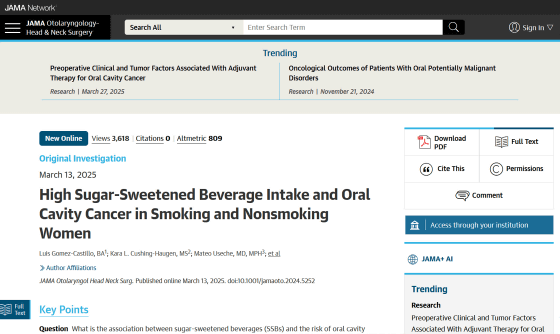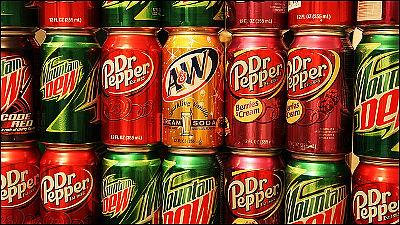It turns out that people who frequently drink 'sweetened drinks' may be more susceptible to oral cancer

The number of cases of
High Sugar-Sweetened Beverage Intake and Oral Cavity Cancer in Smoking and Nonsmoking Women | Tobacco and e-Cigarettes | JAMA Otolaryngology–Head & Neck Surgery | JAMA Network
https://jamanetwork.com/journals/jamaotolaryngology/article-abstract/2831121

Sugary drinks and risk of cancer in the oral cavity
https://sciencemediacentre.es/en/study-shows-women-high-consumption-sugary-drinks-was-associated-increased-risk-oral-cavity-cancer
Oral Cancer Cases Are on The Rise, And Sugary Drinks Could Be to Blame : ScienceAlert
https://www.sciencealert.com/oral-cancer-cases-are-on-the-rise-and-sugary-drinks-could-be-to-blame
The main risk factors for oral cancer are smoking, chewing tobacco, heavy alcohol consumption, and human papillomavirus (HPV) . However, despite a decline in smoking rates worldwide in recent years, oral cancer cases are increasing in Japan , the UK , the US , India , and other countries.
In a paper published in March 2025, a research team from the University of Washington in the United States stated, 'The incidence of oral cancer is increasing among non-smokers and young people without traditional risk factors. Intake of sugary sweet beverages has been associated with various gastrointestinal cancers, but the association with oral cancer has not been investigated,' and conducted a study to examine the association between sugary sweet beverages and oral cancer.
The study used data from the Nurses' Health Study (NHS) and Nurses' Health Study II (NHSII), large-scale studies of female nurses. All subjects were female nurses, and subjects with a history of cancer, abnormal calorie intake, or missing data on sugar-sweetened beverage intake were excluded from the analysis.

The follow-up period for the NHS was from 1986 to 2016, and for the NHSII was from 1991 to 2017. Of the total 162,602 people analyzed, 124 people were reported to have developed oral cancer during the follow-up period.
An analysis looking at sugar-sweetened beverage intake found that people who drank one or more servings of sugar-sweetened beverages per day had a 4.87 times higher risk of developing oral cancer compared with people who drank less than one serving per month.
In addition, when the study was limited to people who rarely or never smoked or drank alcohol, people who drank one or more sugar-sweetened beverages per day had a 5.46 times higher risk of developing oral cancer compared to those who drank less than one beverage per month.
The study only examined correlations, not causation, between drinking more sugary drinks and a higher risk of oral cancer. However, the science media outlet Science Alert said, 'The association is strong enough to suggest that there is some kind of relationship here.'

One possible reason for the increase in oral cancer patients despite a decrease in smoking and drinking habits is that 'an increase in unhealthy diets is triggering a long-term inflammatory response by the immune system.'
'Western dietary patterns, characterized by high levels of saturated fat, processed foods and sugar, are increasingly being recognised as a risk factor for gastrointestinal cancers. Our hypothesis is that a diet high in added sugars may contribute to chronic inflammation and thus be a risk factor for oral cancer,' the research team wrote in their paper.
'The methodology and quality of the study are excellent, and the data has been analyzed in great detail,' said Raul Zamora Ros of the Catalan Institute of Oncology, who was not involved in the study. However, he pointed out that the small number of cases and the fact that the subjects were only female nurses may mean that the results cannot be generalized to other populations. In addition, more and more people are replacing sugary drinks with artificially sweetened drinks in recent years, but he argued that further research is needed to evaluate whether artificially sweetened drinks are harmful.
Related Posts:







